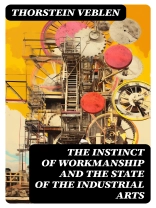In ‘The Instinct of Workmanship and the State of the Industrial Arts, ‘ Thorstein Veblen presents a profound critique of the social and economic structures that shape industrial production. With a keen sociological lens, Veblen explores the innate human drive toward creativity and craftsmanship, arguing that societal norms often stifle this instinct in contemporary industrial societies. The book blends rigorous analysis with a distinctive prose style, incorporating humor and irony to illuminate the paradoxes of capitalism. Placing the evolution of industrial arts within the broader context of social evolution, Veblen elucidates how cultural values shape technological progress and human labor. Thorstein Veblen was an influential economist and social critic active during the late 19th and early 20th centuries. His formative experiences as a member of the Midwestern farming community and his academic background in sociology informed his views on how economic activities affect societal relations. Veblen’s interest in the interplay between technology and craftsmanship arose from his desire to advocate for a more equitable industrial system that respects the innate artistic tendencies of workers, as opposed to mere profit-driven motives. This book is essential for readers interested in economic sociology, industrial relations, and the philosophy of technology. Veblen’s incisive arguments remain relevant in today’s discussions on productivity, labor rights, and the value of creative work. As such, it invites a reevaluation of how we perceive work in the contemporary world, making it a must-read for scholars and general readers alike.
Despre autor
Thorstein Veblen (1857–1929) was an American economist and sociologist, well-known for his provocative critique of business practices and their societal impact. Born to Norwegian-American parents and influenced by the pragmatist philosophy and evolutionary science of his time, Veblen’s intellectual legacy endures through his examination of the intersection between economy and society. One of his notable contributions, ‘The Instinct of Workmanship and the State of the Industrial Arts’ (1914), explores the evolution of the economic process by examining human’s innate drive for workmanship and the influence of industrial arts on social structure. Veblen’s insights into the impetus behind craftsmanship and its industrial manifestations reflect a broader theme present throughout his work—that of economic classes, consumerism, and the leisure class, as highlighted in his pivotal book ‘The Theory of the Leisure Class’ (1899). Veblen’s writings are characterized by a rich and astute commentary on the human tendency to engage with and be shaped by the industrial and economic environment. His literary style combines a rigorous scholarly approach with a sardonic wit, contributing to his reputation as a biting social critic and a foundational figure in the institutional economics movement. Veblen’s influence extends beyond economics to various fields, including sociology, history, and political science, and his conceptual framework set the stage for subsequent generations of thinkers concerned with the complexities of economic systems and social norms.












